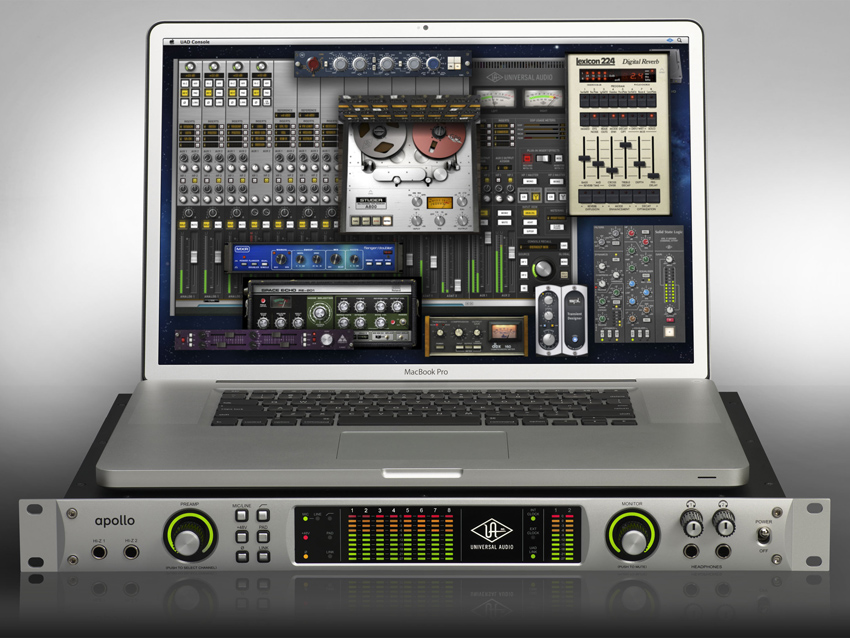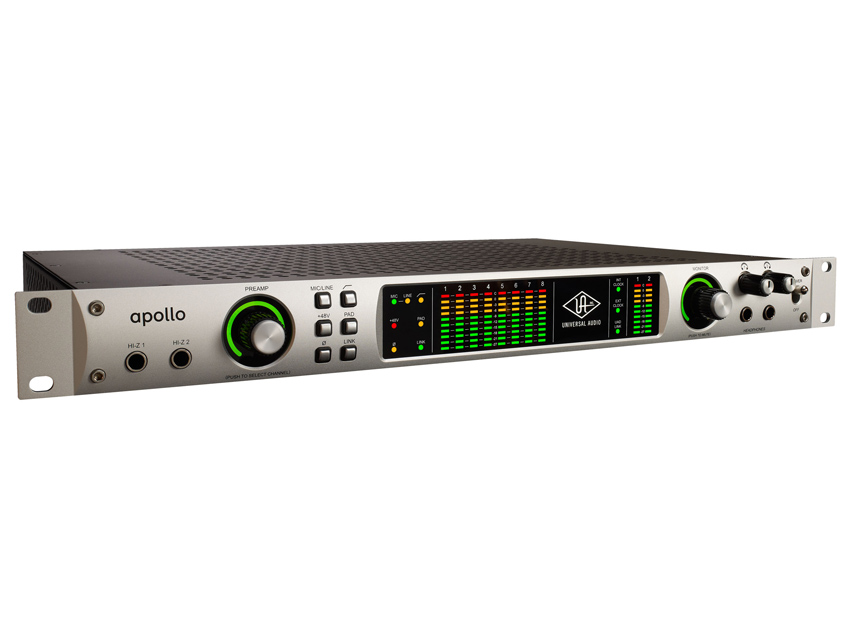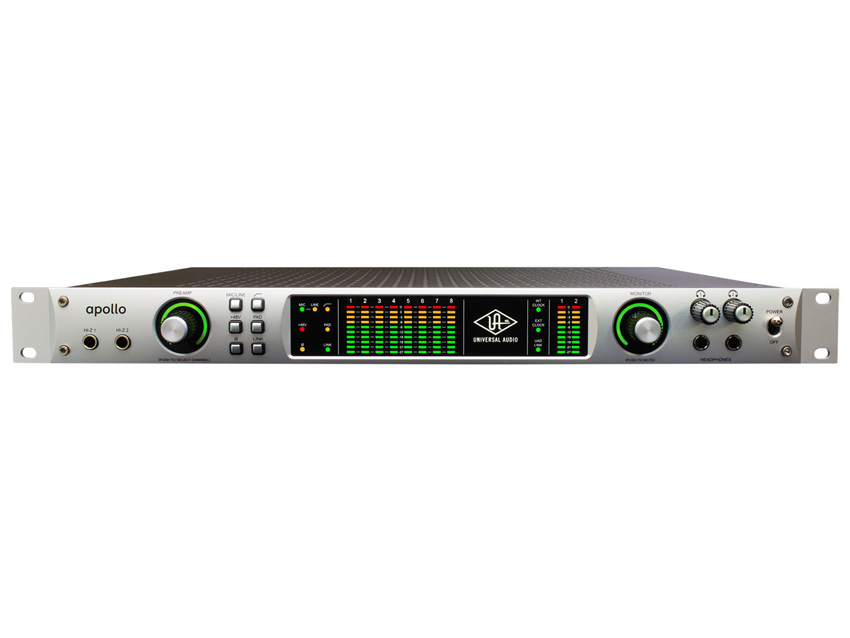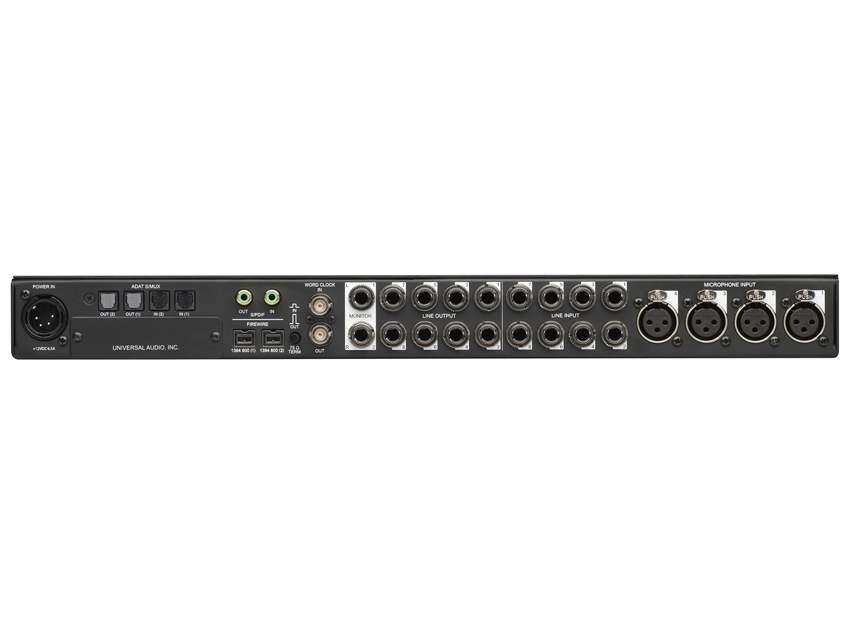NAMM 2012: Universal Audio Apollo - audio interface with UAD DSP
Want all the hottest music and gear news, reviews, deals, features and more, direct to your inbox? Sign up here.
You are now subscribed
Your newsletter sign-up was successful

Universal Audio Apollo

Universal Audio Apollo angle

Universal Audio Apollo front

Universal Audio Apollo rear
NAMM 2012: Given its prowess in both the recording and digital processing fields, a Universal Audio audio interface with built-in DSP sounds like a great idea to us, and this is what's just been announced in the shape of the Apollo.
Click here for a gallery of Universal Audio Apollo product images
At its heart, it's high-end 24-bit/192kHz recording front end, but it also enables you to track through the UAD range of powered plug-ins. It'll be available in Duo and Quad processing guises in the first quarter 2012, with prices estimated at $1,999 and $2,499 respectively.
It's worth noting that a Thunderbolt option card is set to be made available too, which will enable "lower latency, reduced audio buffer size, improved performance at high sample rates, and greater UAD plug-in instances" in comparison with FireWire.
Apollo has plenty going for it, then - here's the official line from Universal Audio.
Universal Audio Apollo press release
Universal Audio (UA), a leading manufacturer of professional audio recording hardware and software, is proud to announce Apollo®, a high-resolution audio interface that combines UA's analog design heritage with esteemed UAD Powered Plug-Ins in a sleek, elegant recording system for Mac and PC*. With Apollo, music producers and performers can finally track through UAD Powered Plug-Ins in real time, via a professional 18 x 24 FireWire/Thunderbolt™-ready audio interface that delivers class-leading 24-bit/192 kHz sound quality.
"Apollo is the culmination of 10 years of analog and digital audio development here at UA," said Bill Putnam Jr., Universal Audio founder. "In many ways, it's brought the analog and digital sides of our company together. With Apollo, we're delivering the sound, feel, and flow of analog recording with all the conveniences of modern digital equipment, including next-generation Thunderbolt technology."
Apollo is, first and foremost, a well-built, high-resolution audio interface, featuring premium mic preamps and top-end converters to deliver the lowest THD and highest dynamic range in its class. Its Core Audio and ASIO* drivers ensure compatibility with all major DAWs, including Pro Tools, Logic Pro, Cubase, Live, and more. Moreover, Apollo's Console application and companion Console Recall plug-in (VST/AU/RTAS) provide control and recall of all interface and UAD plug-in settings within individual DAW sessions, even months and years later.
Want all the hottest music and gear news, reviews, deals, features and more, direct to your inbox? Sign up here.
Apollo differentiates itself from all other audio interfaces, however, via its onboard UAD-2 DSP Acceleration. This onboard processing allows for recording through UAD-2 Powered Plug-Ins — with nearly instant sub-2ms latency — so that music producers can quickly monitor, audition, and "print" audio using a wide range of popular analog emulation plug-ins from Ampex, Lexicon, Manley, Neve, Roland, SSL, Studer, and more.** In this way, Apollo's sonic character and tonal options are virtually limitless. The onboard UAD-2 processors are also available for mixing and mastering, offloading processing from the host computer.
Notably, Apollo offers compatibility with Intel's new Thunderbolt technology, as found on the newest iMacs, MacBook Pros, and MacBook Airs. Available via a user-installable Thunderbolt Option Card (sold separately), Thunderbolt provides lower latency, reduced audio buffer size, improved performance at high sample rates, and greater UAD plug-in instances versus FireWire.
"Thunderbolt technology makes possible a whole new class of products to enhance music production workflows and creativity," says Jason Ziller, Director of Marketing and Planning for Thunderbolt technology at Intel® Corporation. "Products like Universal Audio's Apollo are using Thunderbolt to rock music producers' worlds."
Apollo incorporates numerous design hallmarks from classic UA analog gear, including its fast, easy workflow. Dedicated front-panel controls are present for all the most common features, including preamp gain, channel selection, mic pad, +48V phantom power, low cut, monitor level, and dual headphone controls.
Apollo's connectivity includes 4 digitally controlled analog mic preamps, 8 balanced line inputs and outputs, dual front-panel JFET DIs, digitally-controlled analog monitor outputs, 8 channels of ADAT, 2 channels of S/PDIF, word clock I/O, FireWire 800 (standard), and a Thunderbolt expansion bay — making it a well-equipped centerpiece for the modern project studio.
The Apollo High-Resolution Audio Interface will be available in both DUO CORE and QUAD CORE processing formats (with either two or four Analog Devices SHARC processors, respectively). Apollo will be shipping in the first quarter of 2012, with an estimated street price of $1,999 (DUO processing model) and $2,499 (QUAD processing model). Apollo's Thunderbolt Option Card will be shipping in the first half of 2012, with pricing TBD.

I’m the Deputy Editor of MusicRadar, having worked on the site since its launch in 2007. I previously spent eight years working on our sister magazine, Computer Music. I’ve been playing the piano, gigging in bands and failing to finish tracks at home for more than 30 years, 24 of which I’ve also spent writing about music and the ever-changing technology used to make it.